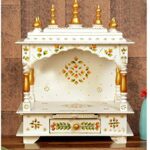Introduction
Diwali, also known as Deepavali, is one of the most significant and widely celebrated festivals in India. The name “Diwali” is derived from the Sanskrit word “Deepavali,” which means a row of diyas (Earthen lamps).
This festival symbolizes the victory of light over darkness and good over evil. In this blog, we will explore the rich traditions and significance of Diwali, also known as the Festival of Lights.
The Significance of Diwali / Why Diwali is celebrated
Diwali is celebrated for multiple reasons, each of which reflects the diverse cultural and religious tapestry of India:
The Return of Lord Rama: One of the most well-known stories associated with Diwali is the return of Lord Rama to Ayodhya after completing 14 years vanvas and defeating the demon king Ravana.
The people of Ayodhya welcomed him by lighting oil lamps, or diyas, to symbolize his triumph over darkness and his safe return.
Goddess Lakshmi’s Blessings: Diwali is also dedicated to Goddess Lakshmi, the goddess of wealth and prosperity. Hindus believe that by lighting lamps and performing rituals, they invite her into their homes, seeking her blessings for a prosperous and abundant life.
Celebration of Harvest: In some regions of India, Diwali coincides with the harvest season. It is a time when farmers celebrate their bountiful crops, offering thanks to the god for a successful harvest.
Veneration of Other Deities: Beyond Lord Rama and Goddess Lakshmi, Diwali is also associated with the worship of various other deities, depending on regional and cultural traditions. In some areas, people worship Lord Krishna, Lord Ganesha, and other gods and goddesses.
Traditions and Customs
Diwali is marked by several customs and rituals, making it a time of joy, unity, and reflection:
Lighting Diyas: One of the most iconic aspects of Diwali is the lighting of diyas or oil lamps. Homes and streets are adorned with these lamps to symbolize the victory of light over darkness and to invite good fortune.
Fireworks and Firecrackers: Diwali is famous for its colourful and vibrant fireworks displays. Firecrackers light up the night sky, creating a spectacle of sound and color.
Rangoli: People create beautiful rangoli designs on the floor, using colourful powders, rice, or flower petals. These designs are both decorative and symbolic, signifying welcome and auspiciousness.
Exchange of Gifts: It is customary to exchange gifts and sweets with family, friends, and neighbours during Diwali as a gesture of love and goodwill.
Sweets and Feast: Special sweets, known as “mithai,” are prepared and shared. Families come together to enjoy delicious meals, often featuring a variety of traditional dishes.
Prayers and Pujas: Diwali is a time for prayer and devotion. People visit temples to seek blessings from the deities and participate in special pujas and rituals.
The Message of Diwali
Beyond the customs and festivities, Diwali conveys a profound message of hope, unity, and the eternal victory of good over evil. It is a time for individuals to reflect on their own inner light and to kindle the spirit of compassion and love. The lighting of lamps serves as a reminder to dispel the darkness within and to cultivate positivity and kindness.
In conclusion, Diwali is a festival that not only illuminates the night sky with its dazzling fireworks but also brightens the hearts and homes of millions.
It is a time to celebrate the victory of righteousness, express gratitude for life’s blessings, and strengthen bonds with family and friends.
As you celebrate Diwali, may the glow of diyas fill your life with warmth and happiness, and may the light of this festival guide you on the path of righteousness and goodness. Happy Diwali!








